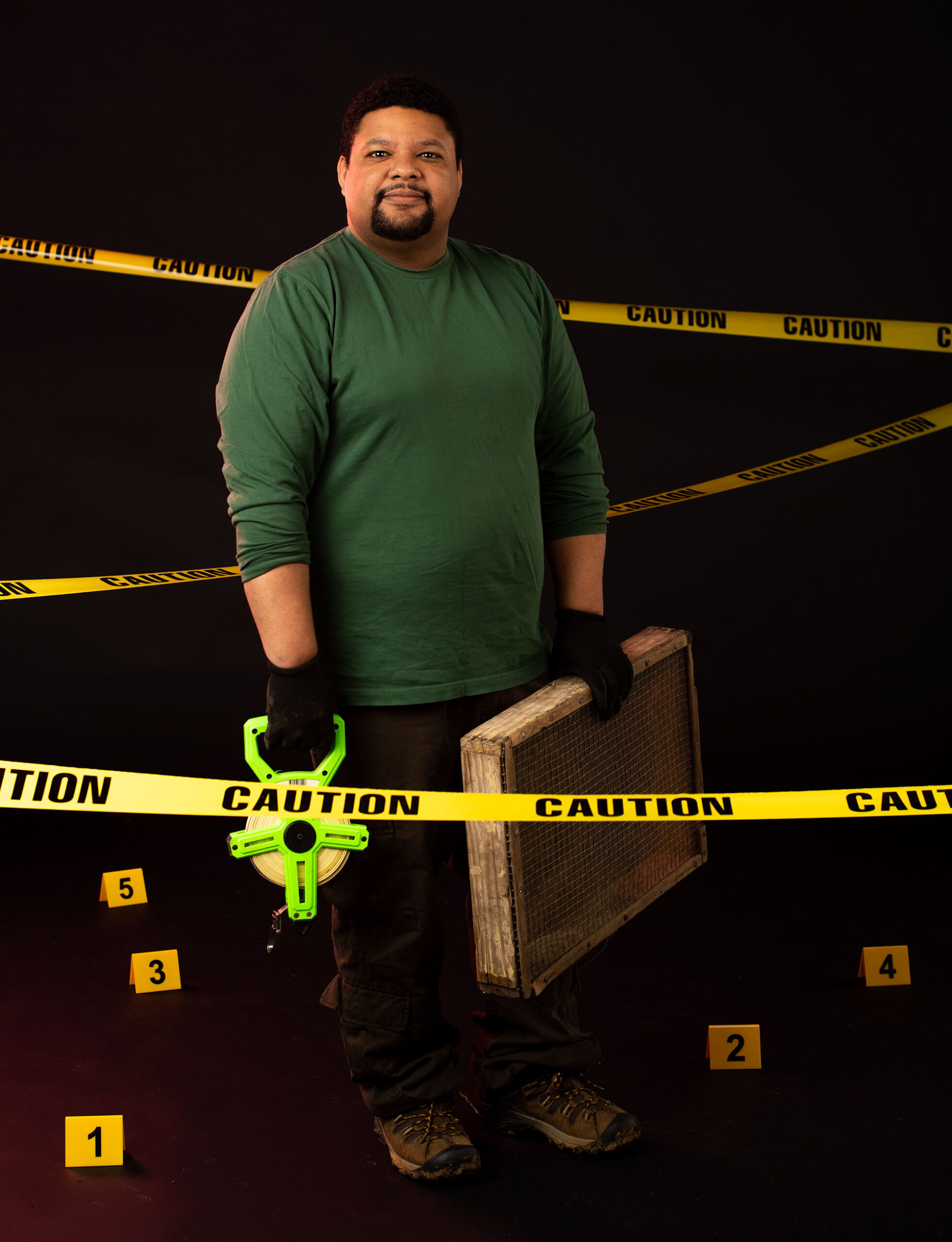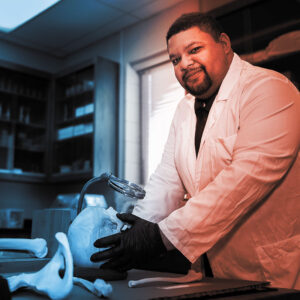
Goliath helps families find answers as a ‘last responder’
Jesse Goliath speaks for the dead—not through last words or wills and testaments but by making sure their stories don’t go unfinished. A forensic anthropologist, he uses his knowledge and skills to identify and determine possible causes of death for people who met unfortunate ends.
He calls himself a “last responder,” the person who comes in when the time has passed for emergency intervention and helps bring closure to a person’s life.
“After the pandemic, everyone became familiar with the term ‘first responders.’ They’re the ones who get pizza and appreciation days for their hard work,” Goliath said. “It’s harder for them to think about us last responders, the ones who care for the dead and finish their stories.”
A native of Brooklyn, New York, who grew up in West Virginia, Goliath came of age at the onset of the “CSI effect”—a surge in the public’s awareness of forensic science spurred by the popularity of the “CSI: Crime Scene Investigation” television franchise. While that show drove college students in the mid-2000s to careers analyzing DNA, fingerprints and blood spatter, Goliath says his chosen field more closely resembles “Bones,” the FOX hit that features an anthropologist who reads bone to identify victims and solve crime.
“When people ask me what I do, I have to figure out how to tell them ‘I look at dead people,’ but not in a weird way. I use ‘Bones’ to provide a window into what I do so people can understand,” Goliath explained. “And it’s interesting to watch shows like that and see storylines inspired by cases I or my colleagues have worked.
“The good thing about the TV shows is they wrap up their cases in 45 minutes to an hour,” he continued. “In real life, cases can take weeks, months or even years to come to trial. And while it’s fun and exciting to get to work with skeletons and do neat science, we always want to keep in mind that this person had a life, had people who are looking for them and had something really bad happen. It’s up to us to piece together that story.”
Now an assistant professor in Mississippi State’s Department of Anthropology and Middle Eastern Cultures, Goliath earned a bachelor’s degree from Notre Dame before earning master’s and doctoral degrees from Ohio State, where he first decided to pursue the forensic side of the discipline.
“After the pandemic, everyone became familiar with the term ‘first responders.’ They’re the ones who get pizza and appreciation days for their hard work.It’s harder for them to think about us last responders, the ones who care for the dead and finish their stories.” ~ Jesse Goliath
“While getting my Ph.D., I realized I couldn’t just go out with my degree and immediately find work,” Goliath explained. “I needed real-world experience, so some fellow graduate students and I consulted for the Franklin County medical examiner’s office and the Columbus police department in Ohio. Most of the cases involved unhoused individuals but in one case, we ended up discovering a body dumping ground for the MS-13 drug cartel. After exhuming remains that showed evidence of execution with something like a machete, and realizing the potential danger it exposed us to through excessive media coverage, I thought I might need a break for a while.”
Branching out from the criminal side of forensic anthropology, Goliath took his skills and freshly minted Ph.D. to Hawaii. There, he worked for the Department of Defense identifying the recovered remains of prisoners of war and missing-in-action military personnel, primarily from WWII and the Korean and Vietnam wars. He said DoD reports show there are approximately 80,000 unidentified remains of American military personal across the world. Of those, about half are thought to be recoverable and identifiable.
Goliath pursued that work for five years.
“The POW-MIA project is a very noble mission, but for a researcher there was a lot of bureaucracy involved,” Goliath explained. “I liked the job, but I wanted to get back to teaching and doing research.”
That’s when he found Mississippi State University and the unique opportunity to combine his interest in teaching, applied anthropology and research. Goliath signed his contract and bought a house before even setting foot in the Magnolia State.
“I felt like this department had a family-like atmosphere and that’s been true,” Goliath said. “I have wonderful colleagues and a whole institutional family.”
Goliath wasted no time getting to work upon his 2021 arrival in Mississippi. Within his first semester, he was called in to assist with the highly publicized Felecia Cox missing persons case when her brother-in-law, in a death row confession, admitted to killing her and provided authorities with a crudely drawn map to her remains in rural Pontotoc County.
“It was a 14-year-old case,” Goliath explained. “Her killer was set to be executed for a previous crime and didn’t want to go to trial for this as well, so he left a letter and a map to be opened after his execution. My MSU colleagues and I went out to the area indicated and used ground-penetrating radar to search for anomalies in the soil so we could find where she was buried and exhume the remains.
“The victim’s family had come out to watch the search process and, to me, seeing the family’s emotional response was the hardest part,” he continued. “I’ve seen some gruesome crime scenes, but concentrating on detailed documentation and helping the person is how you get through it.”
The Cox case is one of seven Goliath has helped with in his two years at State. It was through that work that he realized the State of Mississippi does not have a unified database for collecting information on missing or unidentified persons.
“I knew if we could create a database for Mississippi, we could not only track who is missing, but also identify where people go missing from, how long it takes them to be found and other information that would help us see the big picture.” ~ Jesse Goliath
“There is a federal database, but there is no mandate for agencies to enter their information into it,” Goliath explained. “I knew if we could create a database for Mississippi, we could not only track who is missing, but also identify where people go missing from, how long it takes them to be found and other information that would help us see the big picture.”
This led Goliath to found the Mississippi Repository for Missing and Unidentified Persons Project with MSU colleague Jordan Lynton Cox. Funded by an internal grant from the College of Arts and Sciences, the project is poised to make a big impact on the search for the missing across the state.
Though it is still in development, the web-based database currently has more than 500 missing person profiles, and student researchers comb the internet daily for new information or new cases. Of the individuals in the database, 77% are still missing, 7% have been found alive and 16% were found deceased. And the database has already provided preliminary insights, including the counties with the highest number of missing individuals and the demographic breakdown of those individuals compared to state census data.
Area law enforcement say having someone with Goliath’s expertise available to assist with cases and developing tools like the missing and unidentified persons database is an invaluable asset to their work.
“It is very beneficial for our detectives to have a forensic anthropologist working with our agency to help identify potential human remains and working alongside us to identify missing persons,” explained Lowndes County Sheriff Eddie Hawkins.
“One of our biggest fears is that a case will be forgotten over time. Dr. Goliath created a way for everyone to be reminded of people who are still missing and hopefully create a lead that will help find them,” he continued. “Our goal is for no one to be forgotten, and Dr. Goliath’s work on the missing and unidentified person database is the tool we need to accomplish that goal. We appreciate all he is doing for the State of Mississippi.”
By Susan Lassetter, Photos by Grace Cockrell
Forensics in the Field
 As the state with the worst case backlog of evidence waiting to be processed, Mississippi needs forensic investigators. As an assistant professor at Mississippi State and the university’s first Fellow in the American Academy of Forensic Sciences, Jesse Goliath is hoping to help fill that gap.
As the state with the worst case backlog of evidence waiting to be processed, Mississippi needs forensic investigators. As an assistant professor at Mississippi State and the university’s first Fellow in the American Academy of Forensic Sciences, Jesse Goliath is hoping to help fill that gap.
“We don’t have enough trained forensic anthropologists, period,” Goliath said. “And someone with that training can give law enforcement additional insights that could lead to an identification.
“Anthropology brings in a new perspective that you typically don’t see in law enforcement or the very formulaic reporting of DNA or toxicology,” he continued. “It is more of a cultural awareness and making connections with cultural, environmental and social issues.”
Goliath said he is also using his personal experience as someone of mixed ancestry to shed light on the need for more diversity in the field and more understanding of modern populations into the science.
“Some methods do not work for all populations, especially when determining race or ancestry,” Goliath explained. “For instance, my family is from the Dominican Republic and Cuba, and is a mix of West Africans, indigenous Taino and European Spaniards.
“When you have a melting pot like that, you’re going to have people with mixed identity and mixed ancestry who might or might not have physical characteristics that show that,” he continued. “So, methods for identifying race or ancestry might have worked with populations from the 1940s or ‘50s but it doesn’t make sense with recent populations. And sometimes it takes someone from the communities in which we are working to notice that, which is why it’s important to increase representation in our field.”





